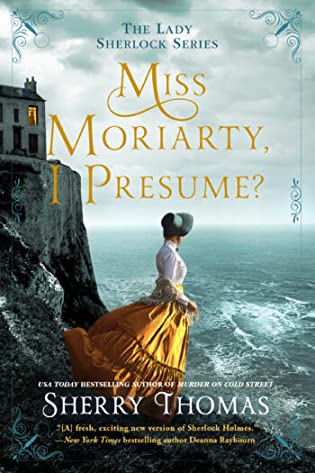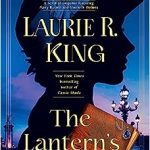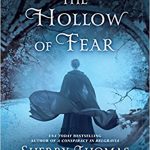 Miss Moriarty, I Presume? (Lady Sherlock, #6) by Sherry Thomas
Miss Moriarty, I Presume? (Lady Sherlock, #6) by Sherry Thomas Format: eARC
Source: supplied by publisher via Edelweiss
Formats available: hardcover, paperback, ebook, audiobook
Genres: historical fiction, historical mystery
Series: Lady Sherlock #6
Pages: 368
Published by Berkley Books on November 2, 2021
Purchasing Info: Author's Website, Publisher's Website, Amazon, Barnes & Noble, Kobo, Bookshop.org
Goodreads
Charlotte Holmes comes face to face with her enemy when Moriarty turns to her in his hour of need, in the USA Today bestselling series set in Victorian England.
A most unexpected client shows up at Charlotte Holmes's doorstep: Moriarty himself. Moriarty fears that tragedy has befallen his daughter and wants Charlotte to find out the truth.
Charlotte and Mrs. Watson travel to a remote community of occult practitioners where Moriarty's daughter was last seen, a place full of lies and liars. Meanwhile, Charlotte's sister Livia tries to make sense of a mysterious message from her beau Mr. Marbleton. And Charlotte's longtime friend and ally Lord Ingram at last turns his seductive prowess on Charlotte--or is it the other way around?
But the more secrets Charlotte unravels about Miss Moriarty's disappearance, the more she wonders why Moriarty has entrusted this delicate matter to her of all people. Is it merely to test Charlotte's skills as an investigator, or has the man of shadows trapped her in a nest of vipers?
My Review:
 Charlotte Holmes doesn’t actually utter that paraphrase of Henry Morton Stanley’s famous greeting of Dr. David Livingstone in 1871, although she certainly could have. Miss Moriarty, I Presume? takes place in 1887, during the year of Queen Victoria’s Golden Jubilee.
Charlotte Holmes doesn’t actually utter that paraphrase of Henry Morton Stanley’s famous greeting of Dr. David Livingstone in 1871, although she certainly could have. Miss Moriarty, I Presume? takes place in 1887, during the year of Queen Victoria’s Golden Jubilee.
And at the beginning of this story, Charlotte is contracted to determine whether or not Miss Marguerite Moriarty was every bit as lost as Stanley had been. Her father claimed to be concerned about his daughter’s circumstances. Then again, he also claimed to be a Mr. Baxter and not the infamous Moriarty.
It’s a cat and mouse game, with Moriarty, of course, as the cat. And Charlotte and all she holds dear as a pack of mice – possibly even the three blind mice and their kin. Leaving Miss Moriarty, in this analogy at least, as a being of indeterminate species. Not exactly a free agent. Not currently a part of her father’s many criminal enterprises. Not Charlotte’s friend or ally.
Except, just possibly, in the sense that “the enemy of my enemy is my friend”. Because James Moriarty, whatever he might be calling himself at the moment, is certainly the enemy of them both.
At first, this story feels like a game of smoke and mirrors and yet more of both. James Moriarty presents himself to Sherlock Holmes as Mr. Baxter, the concerned father of Miss Baxter who has taken herself to a remote religious retreat that may have brainwashed his daughter against him in order to swindle her out of her money.
But Charlotte and Moriarty have crossed paths several times before, and his shadow has loomed over every book in the series except the first, A Study in Scarlet Women. Moriarty knows that “Sherlock” is really Charlotte, and Charlotte is all too aware that Mr. Baxter is Moriarty.
 And yet both are pretending that they know nothing more about the other than what lies on the surface. Charlotte is doing her best to protect her loved ones, the hostages to fortune that Moriarty will eliminate the moment Charlotte ceases to be of use to him – or becomes even more of a nuisance than she already is.
And yet both are pretending that they know nothing more about the other than what lies on the surface. Charlotte is doing her best to protect her loved ones, the hostages to fortune that Moriarty will eliminate the moment Charlotte ceases to be of use to him – or becomes even more of a nuisance than she already is.
Therefore, Charlotte’s true mission is to determine Moriarty’s real purpose for this charade, even as she goes through the motions of fulfilling “Mr. Baxter’s” commission. No matter what the man claims, Charlotte knows that his real intent is to eliminate the pesky woman who has bollixed up his plans several too many times already.
And if he can either imprison or eliminate his daughter in the process – so much the better for him.
Escape Rating A-: Miss Moriarty, I Presume? is clearly meant to be the equivalent of The Final Problem in the original Sherlock Holmes canon. Most of the series has been leading towards this moment, a possibly fatal confrontation between Holmes and her nemesis, Moriarty.
But the original canon has been twisted and so has Charlotte Holmes’ solution of that final problem.
At first, while Charlotte is working out James Moriarty’s motives for setting up this puzzle and forcing her into it, she is also faced with the very real concern about Miss Moriarty’s present circumstances.
The religious community Miss Moriarty has retreated to is unconventional at best and suspicious at worst. Miss Moriarty herself has not been seen by anyone in over three months and her door is guarded by multiple dragons. She has done some slightly questionable things with her money, and more than one member of the community has died under suspicious circumstances.
Just because her father wishes ill on both his daughter and Charlotte does not mean there is no cause for concern – merely that her father’s concern is feigned at best. Charlotte’s concern about Miss Moriarty’s situation is quite real and entirely justified, no matter how much she wonders why James Moriarty has sent her to investigate rather than one of the many agents he clearly has stationed in the area.
It’s up to Charlotte to figure out the trap, evade its jaws, and get everyone out in one piece in a way that will force Moriarty to leave them ALL alone. If she can. If she can convince Miss Moriarty that her plan has a hope in hell of succeeding.
Her solution is clever, it’s every bit as convoluted as the plot of Moriarty’s that put her in this position in the first place. And it just might work.
 As a story, this entry in the series was a bit less frustrating and a bit more fun. Many of the issues that have developed during the course of the series so far, not just Moriarty but also Charlotte’s relationship with Ash, her sister’s plight with their parents, her sister’s romantic woes and her half-brother’s escape from Moriarty’s clutches all move toward some resolution, even if they don’t get all the way there. Which they shouldn’t if readers want more of this series – which we most certainly do.
As a story, this entry in the series was a bit less frustrating and a bit more fun. Many of the issues that have developed during the course of the series so far, not just Moriarty but also Charlotte’s relationship with Ash, her sister’s plight with their parents, her sister’s romantic woes and her half-brother’s escape from Moriarty’s clutches all move toward some resolution, even if they don’t get all the way there. Which they shouldn’t if readers want more of this series – which we most certainly do.
Also, this is the first story in the series where Charlotte, for the most part, is able to set aside the ruse of merely serving as the mouthpiece and amanuensis for her invalid brother “Sherlock”. Moriarty already knows her real identity. She still has plenty of secrets but she does not need to hide her light under the proverbial bushel basket to accomplish what must be done. It’s freeing for Charlotte and it’s freeing for both the reader and the story as well.
If this book is the equivalent of The Final Problem, then there is hope that in spite of the ending we have not seen the last of Lady Sherlock – or, for that matter, either James or Marguerite Moriarty and their minions. I hope that will turn out to be the case, and that somehow the equivalent of The Adventure in the Empty House will occur forthwith.





















